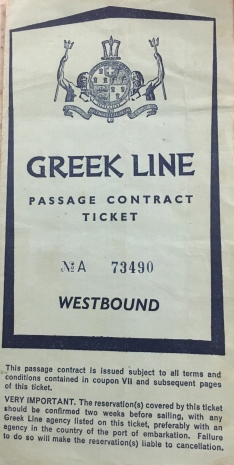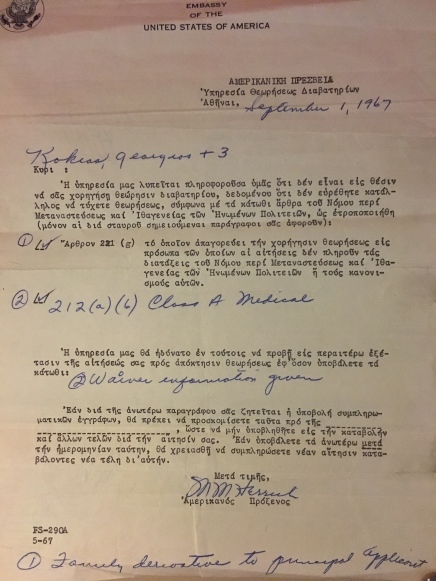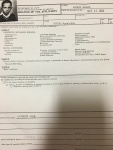Stylianos and Eugenia Kokias-a young Greek couple in search of nothing but a “better life.”
In 1956 Stylianos, translated, Steve, and Eugenia Kokias were given the opportunity to come to America. The couple’s journey was made possible by Eugenia’s brother, who found an employer willing to hire Steve if he came to the United States. Once a letter from the employer was written and approved by the United States embassy, Steve and Eugenia were able embark on their journey. The couple arrived at Ellis Island in New York City in 1956 on a ship named “Vulcania.” They were met by Eugenia’s brother, and brought to Norwalk, CT where they would spend the rest of their lives.
If it were not for Steve and Eugenia’s voyage to America in 1956, a subsequent voyage made twelve years later by Steve’s older brother and his family may have never been possible.

Since arriving in the United States in 1956 Steve wanted his older brother, Georgios Kokias, translated George, to come and join him in living out the “American dream.” But George was doing just fine in Greece. George lived with his family in a town named Pyli, located right outside Trikala, a main city. He owned his own blacksmith business and his own home. He was making enough money that his wife, Christina, was able to stay home and take care of their two children, Apostolos, translated Paul, and Stilianos, Steve. Paul recounts that there was nothing going on that he can recall that was really pushing his family out of Greece, as they were a comfortable, middle class family. Additionally, no one else they knew was migrating to America. Paul says that at the time, many Greeks were actually migrating to West Germany to work for a few years, but usually people returned to Greece. This was all due to the 1960 “Agreement of Employment of Greek People in Germany” which allowed Greeks in search of jobs to obtain temporary work contracts in Germany. Since this agreement, approximately one million Greeks around ages eighteen to thirty-five, mostly from small towns and villages, migrated to Germany to work usually very low paid, laborious jobs. However, it was America that was the “real deal,” the place the lucky ones went for good.
It was truly seen as the land of opportunity. Paul says that people in town were all in awe and jealous that their family would be coming to America, because even though most in their town were middle class, everything in America just seemed better. Although, no one else he knew had a connection or any way of migrating to the United States, which made him and his family’s voyage seem incredible.
Despite the initial apprehensions about leaving behind a pleasant life in Greece, the pull from George’s brother, Steve, in America proved to be enough to get George and Christina Kokias to agree to migrate. However, George’s plan was to make money for ten years or so, and then return with his family to Greece where he hoped to open up a bigger and better blacksmith business. Although, things do not always go as planned. Upon arrival in the United States not only did George never move back to Greece, but he stayed put in the same Connecticut city for the rest of his life.
George, Christina, and their childrens’ voyage to America was planned for 1967. The 1965 Immigration Act allowed more Greeks to migrate to the United States because it ended the national origins quota system and replaced it with a system that gave preference to the relatives of United States citizens and to those with “skills deemed useful to the United States.” Once the 1965 Immigration Act went into effect, approximately 160,000 Greeks migrated to the United States, while in the eighteen years before the Immigration Act of 1965 just 75,000 Greeks migrated to the United States.

It was the Immigration Act of 1965 that made it possible for my dad, Paul, his brother, and my grandparents, George and Christina, both now deceased, to migrate to the United States. Steve found his brother, my “Papou,” George, a job at the company he worked at named PerkinElmer located in Wilton, CT. There my Papou would work as handyman and janitor. With the help of a letter written to the United States embassy by PerkinElmer on my Papou’s behalf and Steve and Eugenia finding my dad and his family a place to live, their plans to America were well on their way.
However, their initial plans to come in 1967 were interrupted when my Papou did not pass the physical examination required to come to the United States. They were told he could reapply to come in a year, but that the rest of the family could go ahead. Christina, my “Yia-yia,” said absolutely not. Separating the family was not an option.
So, on November 23, 1968, once all four family member passed their physicals, my dad, 8, his brother, 11, and my grandparents boarded the Olympia Express in Athens, Greece with two suitcases, two chests, and lots of hope for a safe voyage and successful life in America, to sail West for New York City.
My family’s migration plan can best be explained by the cumulative causation theory of migration. Douglas Massey says that “the causation of migration becomes cumulative because each act of migration alters the social context within which subsequent migration decisions are made, thus increasing the likelihood of additional movement” (Massey 20). In my family’s case, they already had relatives in the United States that organized a job for my Papou and an apartment for my family to live in. Having their family already in the United States allowed them to migrate with a little less stress and little less fear than one migrating with no one on the other side. As Massey explains, “the potential costs of migration are substantially lowered for friends and relatives left behind” (Massey 19). Having relatives already in the United States to help assimilate made things easier.
Like my dad’s Uncle Steve did for them, my dad’s family did for other relatives. Several years after arriving in the United States, my grandparents were able to sponsor other relatives to come to the United States from Greece. By this point my family had begun to establish themselves as best they could. Unlike my first relatives from Greece who arrived in America with no one there to guide them, these family members would have family to help them get acclimated, just as my dad did when he first came.


Hi Katie,
This is so good! I loved reading your family’s story, and I am excited to learn even more. I thought you did a great job incorporating pictures and visuals, especially the old documents like the ticket and the physical examination report. I am curious to find out how your family felt once they were settled in America. Did your Papou like his job at PerkinElmer? How was the transition for your dad? Where did he attend school? How did the U.S. compare to Greece?
Also, something that struck me was when you wrote that Christina, your Yia-Yia, did not want the family to be separated when your Papou failed the physical examination. I think it might be interesting if you expanded on this, especially in consideration with the “Gendered Transitions” article we read earlier in the semester. Additionally, it made me wonder whether or not Greek families generally tried to stay together when migrating to the U.S. Maybe the question of whether your family’s story is similar to or different than the general narrative of Greek migrants can be incorporated in subsequent posts.
With regard to the laws, I thought you integrated the policies very well. I had never heard of the 1960 “Agreement of Employment of Greek People in Germany,” so that was very interesting to read about. On the flip side, it was also cool to see the particular effects of the 1965 Immigration Act, a law we have often encountered in the course, as it was applied to your personal migration account! A specific question I had was before the 1965 Immigration Act, did more Greek migrants go to Germany (or another country for that matter), rather than the U.S.? In other words, would this be an aspect of the “typical” Greek migration story where your family “fit the mold” or was a type of “outlier”?
For theories, I thought you did a great job of applying the “cumulative causation theory of migration” in order to help explain your family’s motives for migrating. Relating it back to the larger ethnic group, is this theory relevant to most Greek migration stories or would other theories that we have learned about be more applicable?
Lastly, I found your blog very easy to navigate, and the hyperlinks you included were relevant and beneficial. One suggestion I have is with the hyperlink “skills deemed useful to US” – I would just list a couple examples of the “useful skills” afterwards as to give a brief glimpse of the more in-depth content of the linked article.
Overall, great job!! And like I said, I look forward to reading more about your family’s story.
LikeLike